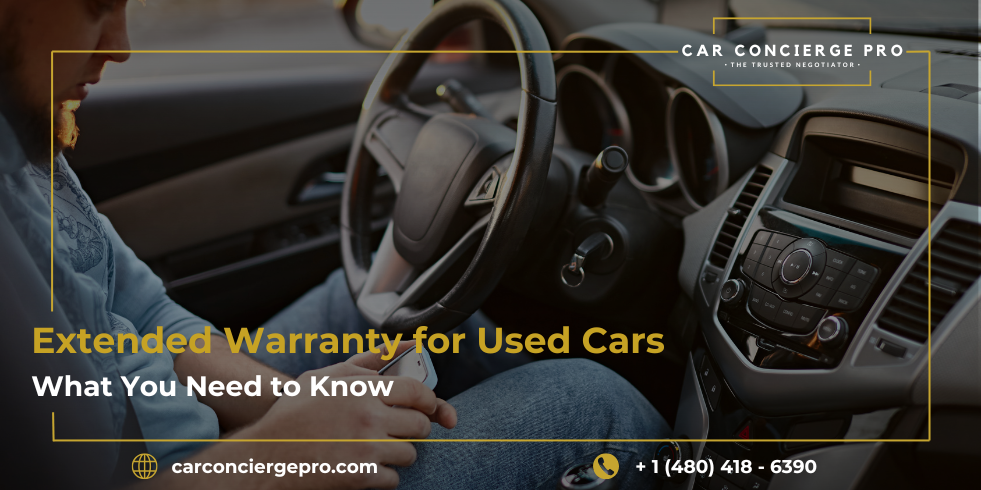Buying a used car is a cost-effective way to own a vehicle, but it comes with uncertainties. Unexpected repairs and maintenance costs can quickly add up, making it essential to consider additional protection. This is where an extended warranty for used cars becomes valuable. But is it really worth it? Let’s dive deep into everything you need to know
Table of Contents
ToggleWhat Is an Extended Warranty for Used Cars?
An extended warranty, also known as a vehicle service contract, provides coverage for repairs after the manufacturer’s warranty expires. Unlike factory warranties that come with new cars, extended warranties are optional and can be purchased separately from either the car manufacturer or third-party providers.
Depending on the plan, an extended warranty can cover essential components like:
- Engine and transmission
- Electrical system
- Climate control system
- Suspension and braking system
The right extended warranty can protect you from unexpected repair costs, ensuring peace of mind and financial security.
Types of Extended Warranty for Used Cars
Extended warranties vary in type and level of coverage. Knowing the types can help car owners choose the best for a vehicle.
- Manufacturer’s Extended Warranty for Used Cars
An extended warranty from a third-party provider is an extended warranty from the original car manufacturer. It usually covers what the factory warranty covers, but for a longer period of time. Not only is it factory-made, you also get high quality service to go along with it from certified mechanics and authorized dealerships. But these warranties can often be pricier than third-party options.
- Third-Party Extended Warranty for Used Cars
Third-party extended warranties come from independent companies, not car manufacturers. Jump to Warranties that are highly customizable plans However, third-party warranties tend to be cheaper, but you must do your due diligence to make sure the provider is reputable. Third-party warranties can come with rigid terms and conditions, so always read the fine print before you buy.
- Powertrain Extended Warranty for Used Cars
Powertrain warranty coverage extends to the most critical components of a vehicle’s drivetrain — specifically, the engine, transmission, and axles. That’s an expensive fix, so powertrain warranties can be a great option for used car owners. But they do not cover other systems like the electrical or climate control systems, which are included under each car’s powertrain warranty.
- Bumper-to-Bumper Extended Warranty for Used Cars
A bumper-to-bumper warranty typically offers extensive coverage of nearly all major components in your car, only excluding normal wear-and-tear items, such as brakes, tires, and wiper blades. Such a warranty is great for people looking for broad protection and peace of mind. Though they are considered superior coverage, bumper-to-bumper warranties tend to be pricier than other extended warranties.
Benefits of an Extended Extended Warranty for Used Cars
There are many advantages to extended warranties that make them an appealing option for used car owners. Some of the main benefits include:
- Financial Protection
Major mechanical failures can be extremely expensive to repair, and when they are unexpected, such as when a car breaks down, it can hit even harder. For car owners, an extended warranty assists them in planning their repair expenses in a way that they do not experience sudden financial stress. With coverage, repairs that would ordinarily be thousands of dollars can be taken care of with very little out-of-pocket expense.
- Increased Vehicle Lifespan
We Did Routine Work And Prompt Repairs Help A Car Last Longer An extended warranty can also encourage the car owner to go through with repairs they might have previously neglected, allowing them to get much more optimistic mileages out of their vehicle.
- Higher Resale Value
Having an active Extended Warranty for Used Cars will make your used car much more appealing to prospective buyers. It assures you that the vehicle has been maintained impeccably and that any future repairs would likely be covered by a warranty. It makes it a good investment because it can result in slightly better resale values.
- Peace of Mind
With their vehicle covered against unexpected breakdowns and repairs, car owners can hit the road confidently. The reassurance that comes from driving a car that would not require mechanic intervention allows people to hit the road without the fear of problems along the way.
Factors to Consider Before Purchasing an Extended Warranty for Used Cars
A few things to weigh before investing in an extended warranty to be sure you’re making the right decision for your situation.
- Coverage Details
You could find that not all extended warranties cover the same things. Certain plans only cover major components, whereas others offer extensive coverage. Read the warranty fine print to know exactly what’s covered (and what’s not) in the plan.
- Cost of the Warranty
Prices for an extended warranty will depend on the type of coverage you are interested in, the provider, as well as your vehicle’s make and model. Evaluate plan features and pricing against rates for your biggest repair bills.
- Provider’s Reputation
If you decide to buy an extended warranty from a third party, then research the provider’s reputation. You can verify the trustworthiness and reliability of the company by checking for customer reviews, ratings, and industry accreditations.
- Transferability
If you sell your vehicle, some extended warranties, can be transferred to a new owner. In fact, a transferable warranty can make your car more appealing when sold, which can up its resale value.
- Deductibles and Claims Process
Learn how much a warranty of this type will cost you, including any deductible fees and how to file a claim in advance. Most warranties also come with high deductibles, a cost that can affect overall affordability. Look also at whether the claims process is simple and hassle-free.
Is an Extended Warranty for Used Cars It?
Whether or not to get an extended warranty hinges on multiple factors, including the reliability of the car, driving habits of the owner, and on a financial basis. An extended warranty is also useful for people intending to hold onto their car for a long time or who want extra coverage to defend against expensive repairs. On the other hand, a value candidate with a proven history of reliability and low service costs may not be worth an extended warranty at all.
Is an Extended Warranty for Used Cars Worth It? The Truth About Used Car Protection
As you’re seeking out a used car, one of the questions that you will inevitably face is whether or not you should get an Extended Warranty for Used Cars. This is a common question, with potentially far-reaching financial consequences, and one that many buyers have trouble answering. Is it worth the investment? Does it really deliver the coverage and reassurance it claims? Or are you simply paying for something you may never utilize?
What is an Extended Warranty for Used Cars?
Before we dig into the pros and cons of extended warranties, you need to know what they are and how they work. In a nutshell, an extended warranty (often referred to as a vehicle service contract) is a contract that provides extra coverage beyond what a new car’s standard manufacturer’s warranty offers as a matter of course.
Manufacturer warranties generally cover only a few years of vehicle ownership, or up to a certain number of miles, at which point the car is unprotected. After that period, if something in the vehicle goes wrong, the owner has to pay for repairs out of pocket. An extended warranty, which you can buy from an auto dealership or a third party, can take over at that point, covering many of the same sorts of repairs and services as the original warranty covered, and usually for a longer term.
Coverage of used car extended warranties and their cost vary widely based on the vehicle’s make and model, warranty provider and terms of the contract. Generally, these cover repairs for things such as engine and transmission troubles, electrical system issues as well as other expensive repairs that could very well be financially crippling without the coverage.
But not all warranties are created equal. These plans also have several tiers of protection, from powertrain-only coverage to extensive bumper-to-bumper plans. Some also offer benefits like roadside assistance or rental-car reimbursement. You’ll want to evaluate the particulars of any extended warranty you are considering closely to be sure it works for you.
The Benefits of an Extended Warranty for Used Cars
So, here are reasons you might consider getting an extended warranty for a used car. The primary takeaway is peace of mind. Repairing your car can be quite costly, particularly if you run into a major problem. Despite good maintenance, sometimes unforeseeable issues still arise, and putting out cash for those issues can hurt.
An extended warranty is basically insurance against those surprise expenses. The benefit is that the warranty makes sure you won’t be paying for costly repairs, saving you thousands of dollars in case of a breakdown.
But beyond the cost, extended warranties provide a comforting convenience. You no longer need to waste time hunting around for repair shops or haggling with service providers in the event your car runs into a significant problem. You bring the car to an authorized repair shop, and the warranty provider takes care of the rest.
Additionally, in many cases an extended warranty can maximize your car’s resale value. Some prospective buyers may be less likely to buy a used vehicle if they do not know whether it is under warranty. By including a transferable warranty, you can make your car more appealing to buyers who desire the coverage of a warranty but prefer to avoid the cost of acquiring one on their own.
- Financial Protection from Unexpected Repairs
The greatest advantage of an extended warranty is the protection from expensive repairs. Older cars are more likely to suffer breakdowns or mechanical failures. Repairs can be relatively cheap, but more serious issues, like engine or transmission problems, can run into the thousands of dollars to repair.
Replacing a transmission, for example, can cost between $1,800 and $3,500 or more depending on a car’s make and model. An extended warranty can help you avoid paying this amount out of pocket.
Outside of critical repairs, extended warranties can cover everything from malfunctioning air conditioning and electrical issues, to the cost of replacing expensive parts like the alternator, starter or fuel pump. All of these are common issues that could arise as a vehicle gets older, and an extended warranty can afford you with the peace of mind of protecting you from the steep cost of surprise repair bills.
- Peace of Mind
For some drivers, there’s something to be said for knowing they are protected against unexpected repairs. The process of car ownership, particularly used cars, can also be fraught with anxiety as you are never sure whether or when something will go wrong. An extended warranty might take some of that stress away by guaranteeing that you a need to worry about big expenses if something does happen.
And with an extended warranty, you can enjoy your ride without constantly worrying about breakdowns. This is particularly valuable for drivers who depend on their car for daily transportation or lengthy work commutes.
- Increased Resale Value
While you won’t keep your car forever, an extended warranty can help sell it when you need to. Most buyers want a car that is tried and true but still has some sort of warranty left, which helps minimize the risk for costly repairs. This approach not only makes it more appealing for potential buyers but might even fetch you a higher sale price for your vehicle.
This can be particularly helpful for vehicles with high mileage that may not be easily sellable otherwise. That added peace of mind of being covered for a few more years may persuade buyers to take the plunge.
The Drawbacks of an Extended Warranty for Used Cars
There are definitely pros to getting an extended warranty but here are some cons that you need to take into consideration when deciding if you should even purchase one. Not every vehicle requires an extended warranty, and in certain instances, the price of the warranty may surpass the advantages.
- High Upfront Cost
The most notable downside to extended warranties is the cost — up front. The price of an extended warranty can range from a few hundred dollars to several thousand depending on the make and model of your vehicle. For some buyers, this fee can be a deal-breaker if they are already pushing their budget to buy the car.
Many extended warranties also require full payment upon purchase, so that’s another thing to be aware of. This can put a strain on your finances, which is especially true if the car is an expensive purchase to begin with. You might be able to finance the warranty, but that will increase the total cost.
- Limited Coverage and Exclusions
Not all extended warranties are equal, and some may leave you on the hook for repairs you expect them to cover. You need to read the fine print before you buy, because many plans have exclusions and limitations. Some may exclude coverage for certain parts, or place coverage limits on repairs.
Many warranties also require the owner to maintain an explicit service schedule, in addition to seeing particular service providers, on the car. Not following these terms renders the warranty invalid, and then you’re out of luck.
Be sure you know exactly what is and isn’t covered before you buy a warranty. Look at whether the coverage is extensive enough to warrant the price, and whether it meets your needs.
- The Age and Condition of the Car
Your used car’s age and condition should have a major impact on whether you purchase an extended warranty. High-mileage, older cars may be better off unprotected by an extended warranty since they are more likely to break down in the next few years. In these instances, the cost of the warranty may outweigh the protection it provides.
If your car is fairly new and in decent shape, it probably doesn’t need an extended warranty. Many newer vehicles have long manufacturer warranties that cover most major repairs, and the likelihood of needing to pay for an expensive repair in the near term is lower. In that case, it’s best to save your money for potential repairs down the road instead of paying for an extended warranty that you may never even use.
- Risk of Overpaying
And of course, you always run the risk of paying for an extended warranty and never using it. Although MBR car repairs are sometimes unavoidable, the fact is many vehicles run without any major problems for decades. The money used for the warranty might feel wasted, if your car runs smooth with no problems.
If you’re confident in how reliable your vehicle will be and calculation of possible repairs reveals a low likelihood of incurring high costs, you may not find an extended warranty worth the investment.
Factors to Consider When Deciding Whether to Purchase an Extended Warranty for Used Cars
- If you’re not sure whether to buy an extended warranty, multiple decision points can assist you in making a choice that’s best for you and your circumstances. Consider some questions before proceeding:
- How Reliable is Your Car? Study the make and model of your vehicle. As you may already know, there are certain vehicles that are incredibly reliable and have very few repairs, while others experience many issues. If you drive an especially reliable car, you may not need an extended warranty.
- What Would It Cost to Fix? Investigate the cost of repairs to your car. It means some cars are costly to maintain thanks to expensive parts and labor costs, while others are more affordable to keep on the road. If you find that repairs are often expensive, an extended warranty may be worthwhile.
- What Is Covered Under the Warranty? Check the fine print of the extended warranty. Know what’s included, what’s not and the caps on the coverage. But if the warranty excludes the most important components or has high deductibles, it may not be worth having.
- Can You Afford the Warranty? Think about whether you can afford the initial price of the warranty. If affording the warranty would significantly impact your budget, it may be worth reconsidering buying it.
- How Long Do You Expect To Own The Car? An extended warranty can offer peace of mind if you intend to keep the vehicle long term. But if you intend to sell the vehicle in a timely manner, the warranty might not be comparable to the money you put into it.
Final Thoughts
An extended warranty for used cars offers financial protection, peace of mind, and potential resale value benefits. However, it’s essential to weigh the cost against your car’s reliability, expected repairs, and personal needs. By choosing the right coverage, you can ensure stress-free ownership and avoid unexpected financial burdens.
For expert car concierge services that help you find the best extended warranty options, visit CarConciergePro.com. Our specialists guide you in making informed decisions to protect your vehicle and your budget.




 and Canada
and Canada 




